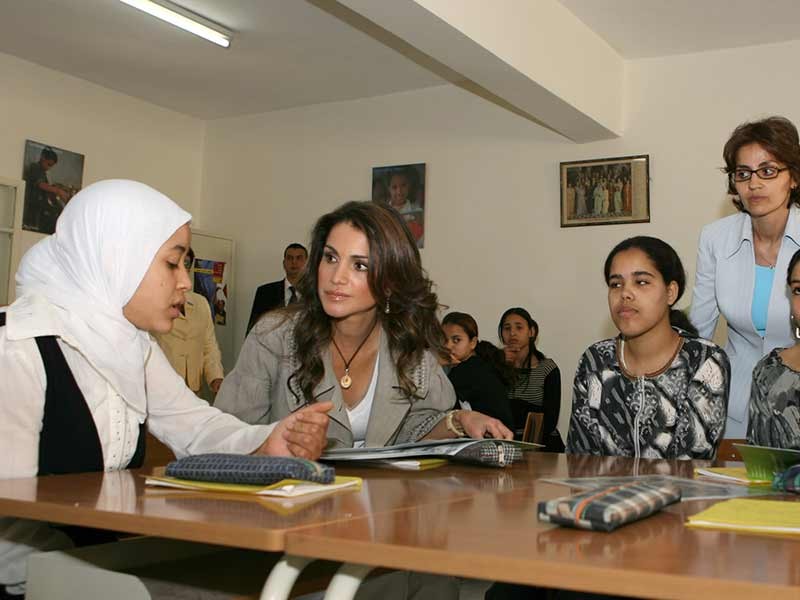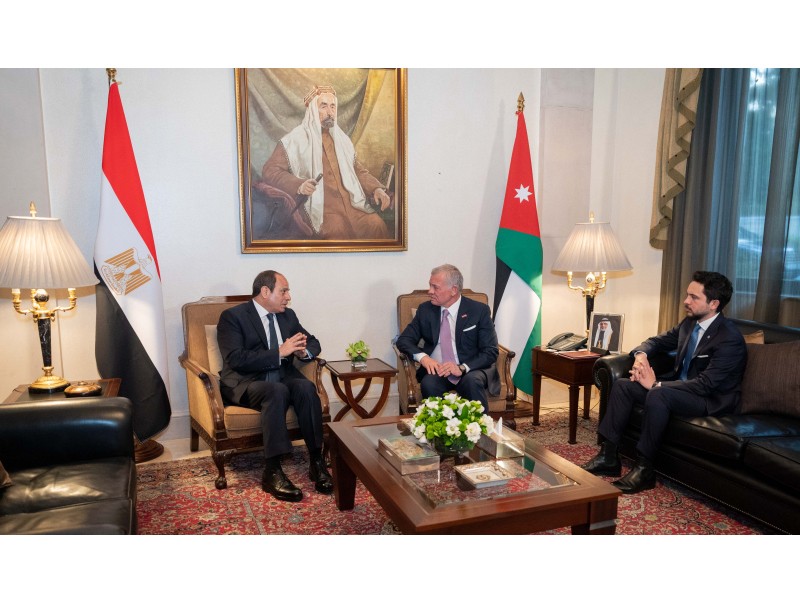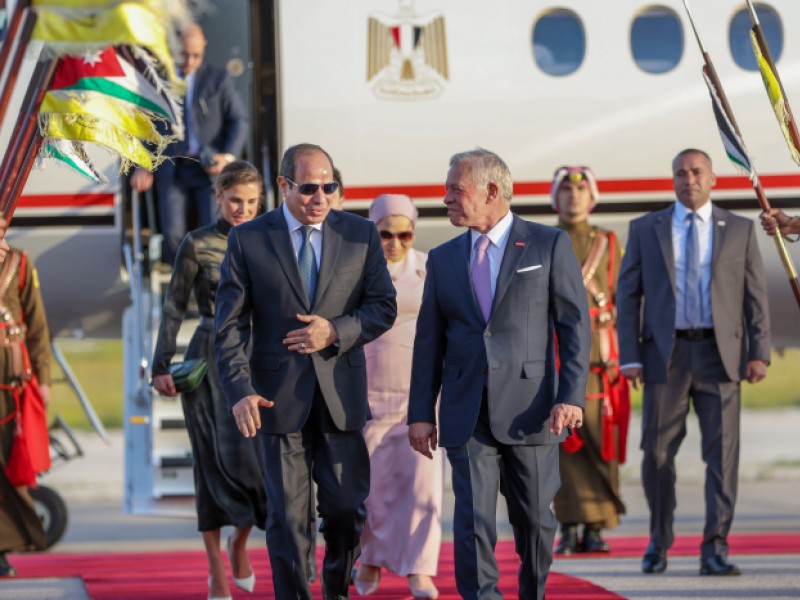Queen Rania Returns to Morocco

(Office of Her Majesty, Press Department - Fez) As part of her mandate as UNICEF's first Eminent Advocate for Children, Her Majesty Queen Rania Al Abdullah visited two UNICEF supported projects in Fez, with Lalla Salma of Morocco, to highlight the country's efforts in combating child labor and promoting education for all.
After their visit Queen Rania said, "In many ways, education is a 'social vaccine' for girls…it immunizes against untimely death, poverty, and unemployment and helps them build healthy, hopeful futures."
To highlight the country's achievements in reintegrating girls into the school system, Queen Rania and Lalla Salma visited a UNICEF supported primary school where they met girls who were formerly working in carpet weaving workshops. The girls joined their royal guests for a frank discussion where they described the conditions under which they worked, the change in their lives, since being integrated into the school, and their hopes for the future.
Many of the girls spoke of long working hours, most of which they spent standing and without provision of food or water, other than that which they managed to bring with them from their homes. Stories of minor abuse were prevalent, but so were the smiles on the girls' faces as they expressed their joy at being enrolled in school.
"I do miss my friends [from the workshop]," said one 12 year-old-girl, "but I am so happy to be in school because now we're taught to read and write and we get to play with our friends – not work."
The government of Morocco, with the support of partners like UNICEF, the International Labor Organization (ILO)/ International Program for the Elimination of Child Labor (IPEC), is playing an integral role in removing young girls from harsh working conditions. Fatima, one of the social workers who works with UNICEF, the ILO/ IPEC, joined the discussion to detail how she managed to get many girls back into school.
"We go to the workshops and factories and try to identify the girls that are just too young to be working," she said, "then we speak with the people in charge and broach the subject with them… we explain why the girls shouldn't be working and then we enroll them in schools close to their homes."
In Morocco, primary school enrolment increased – from 72 percent, in 1999, to 86 percent, in 2004. The country is also working towards achieving gender parity, and the gap between boys' and girls' education decreased to 6 percent during that same period. As per the Millennium Development Goals(MDGs), Morocco is on track to achieve universal primary education by 2015.
"I'm delighted that Morocco, like Jordan, is forging ahead in its efforts to educate girls. A decade ago, primary girls' enrollment in Morocco was under 50 percent. It is greater than 80 percent today," said the Queen.
The Moroccan National Plan of Action for Children, adopted in 2006, is steadily decreasing the number of working children and campaigning to change cultural attitudes and practices.
Despite the fact that education is compulsory until the age of 15 and employment of children under 15 is prohibited in Morocco, over a million children are out of school, the majority of which are girls, and 600 000 children are working.
Although most of the girls who joined Queen Rania and Lalla Salma have lost valuable years of schooling, all of them expressed keen hopes for the future. When asked what they want to do when they grow up, most answered that they would like to study to become physicians. "I'll tell you why," said one 9 year-old-girl, "because I want to be able to help people."
The government of Morocco, alongside partners such as UNICEF, has taken an innovative and bold approach in tackling the problem of child labor by offering non-formal educational opportunities. Non-formal education, here, serves as an entry point for a return to full-time education.
To that end, earlier in the day, Queen Rania and Lalla Salma visited the Moroccan Red Crescent Non-Formal Education Center where a number of enthusiastic teenage girls, who were taking part in a SCREAM (Supporting Children’s Rights through Education, the Arts and Media) activity, took a short break to greet them.
Queen Rania and Lalla Salma joined the girls in the activity, which builds the students' confidence, self-esteem and communication skills. At each table, the girls received different photos and were asked to describe their reactions to what they saw in terms of children's rights.
The Red Crescent offers programs to girls between 12-15 years of age who cannot be re-integrated into the formal school system, and are still employed in various handicraft activities. Those enrolled receive a life-skill education such as basic reading, writing and arithmetic skills and counseling by trained staff.
UNICEF trained employers, non-governmental organizations, social workers and public servants on children’s rights equipped the centers; facilitated the linkages with the health centers; supported the vaccination of working children against tetanus, as well as supporting leisure and play activities for the working children and those re-integrated in schools. The ILO/IPEC program joined UNICEF in 2003.
UNICEF, the Ministry of Education, and other partners have also embraced the Child-Friendly School Model where schools are encouraged to be more participatory, quality oriented and accommodating to children. The partners also involve parents, children and communities in day-to-day decisions. At least 700 schools in Morocco are now using this model and 67 percent of them have reduced the drop-out rate. The child-friendly schools provide access to quality basic education and serve as a practical response to child labor.
Queen Rania, who was appointed UNICEF's first Eminent Advocate for Children this January, advocates a better world for children and highlights achievements of the Millennium Development Goals, which are directly related to health, education and well being of children.
"The right to a childhood of health, education, happiness and dignity is the right of every child - and it is well within our collective capacity to realize that right," said the Queen.
Featured
Queen Rania's official website
This website does not support old browsers. To view this website, Please upgrade your browser to IE 9 or greater
Your browser is out of date. It has known security flaws and may not display all features of this and other websites. Learn how to update your browser



